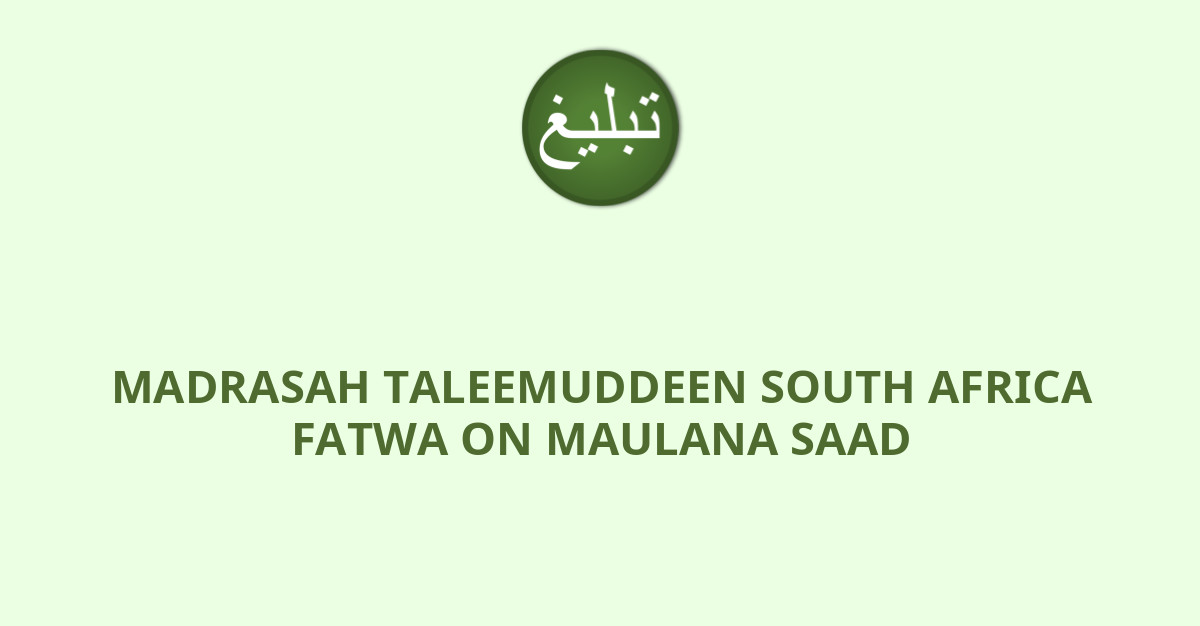The following is a fatwa from Madrasa Taleemuddeen, Ispingo Beach South Africa on Maulana Saad.
Question
We are aware of the current situation of the Nizamuddin Banglawali Mosque. It is having significant effects, especially on those engaged in the work of Jamaat (religious preaching) around the world. In South Africa as well, two viewpoints have emerged. One view is that groups should be sent to Nizamuddin as per the usual routine. The second view is that until the issue of Nizamuddin is resolved, it is appropriate not to send groups there. Please guide us in this matter in light of the pure Sharia.
Answer
This work of Dawah and Tabligh, which was revived in the last century by Maulana Muhammad Ilyas Kandhlawi, has been the most effective means of bringing religion into people’s lives in this century. To date, it remains a means of bringing back countless people who have strayed from the path of religion and a source of guidance and spiritual blessings for millions of people across four corners of the world. For this reason, the current situation in Nizamuddin has become a cause of concern. Everyone is concerned about how this work can continue with unity of purpose in the manner established by Maulana Muhammad Ilyas based on the Quran and Sunnah.
However, the issue is not simply about whose leadership to follow – whether Hazrat Maulana Saad Sahib’s, or Hazrat Maulana Ibrahim Sahib and Hazrat Maulana Ahmad Laat Sahib’s. Nor is the issue simply about whether to go to Nizamuddin or not. No such decision will solve the problem, as the roots of the issue are much deeper. Creating unity is indeed extremely important, but it will only be possible when the correct approach is adopted.
When faced with such a complex situation, guidance is provided in a hadith of our Prophet (peace be upon him). Ali RA reports that he asked the Prophet (peace be upon him), “What should we do if a difficult issue arises for us?” The Prophet (peace be upon him) replied, “Consult the jurists and the devout, and do not make any personal decision.” (Kanz al-Ummal: 2/344)
Keeping in mind the spirit of this prophetic guidance, we carefully studied the fatwa issued by the eminent scholars and muftis of India. One fatwa was published from Darul Uloom Deoband, signed by the rector Hazrat Maulana Abul Qasim Sahib, Shaikh ul-Hadith Maulana Mufti Saeed Palanpuri Sahib, and more than a dozen other senior scholars. Another fatwa came from Dabhel, signed by Hazrat Mufti Ahmad Khanpuri Sahib and several other teachers of Jamia Dabhel. Similarly, a letter was also published from Mazahir Uloom Saharanpur with the endorsement of its senior teachers. Additionally, apart from the teachers of Dabhel and Mazahir Uloom, a highly respected scholar of India, Maulana Zaid Mazahiri Nadwi, professor at Nadwatul Ulama Lucknow, has also written a detailed letter to Hazrat Maulana Saad Sahib, a copy of which we also have. After carefully studying all these writings, we agree with the conclusion reached by these eminent scholars and grand muftis.
The main complication in this issue is that many statements made by Hazrat Maulana Saad Sahib in gatherings and other assemblies have been found to be highly objectionable. In his letter to Maulana Saad Sahib, Mufti Zaid Sahib wrote that after reading some of Maulana Saad Sahib’s writings and directly listening to his speeches in gatherings, he realized that not just one or two, but many things have deviated from the path of truth and the straight path, and contradict the majority opinion and the explicit statements of jurists and hadith scholars. He also wrote to Hazrat Maulana Saad Sahib that many of his statements and sayings are against the Hanafi school of thought, many statements lead to a diminution in the status of prophets, companions, and the rightly-guided caliphs, and many of his statements are resulting in distancing from scholars, spiritual guides, and spiritual retreats, and creating doubts about them, which is causing division in the ummah instead of unity.
Clearly, this is an extremely serious matter. Therefore, the issue is no longer simply about whether to go to Nizamuddin or not. Rather, the issue now is to ensure that this work remains on the right path and does not deviate from the Sharia and Sunnah. The preservation of the work in its correct form is far more important than the personalities on either side. If these personalities are put first, even if the work deviates from the right path as a result, it would be like the statement of the Children of Israel who said, “We found our forefathers following a certain way, and we will continue to follow in their footsteps.” (Quran)
Now that prestigious religious institutions in India have expressed such serious objections, until these objections are addressed and these clarifications are accepted by the senior scholars, and a clear, unconditional retraction comes from Hazrat Maulana Saad Sahib, we will be compelled to request people, as a religious ruling, to refrain from listening to his statements. Otherwise, we ourselves would be responsible for involving them in ideas and thoughts that have been fully condemned by senior scholars.
Allah’s command in Surah An’am is: “And when you see those who engage in [offensive] discourse concerning Our verses, then turn away from them until they enter into another conversation. And if Satan should cause you to forget, then do not remain after the reminder with the wrongdoing people.” (Surah An’am, Verse: 68)
Hazrat Mufti Shafi Sahib writes in the interpretation of this verse that it includes distorting the meaning of any verse, i.e., deriving meanings from the Quran that are contrary to the explanation and interpretation of the Prophet (peace be upon him) and the companions, or contrary to consensus. Similarly, Abdullah Ibn Abbas said that the concept of this verse also includes those who make wrong changes to the Quran, distort its meaning, or innovate. (Ma’arif ul-Quran: Vol 2, p 584)
Hazrat Mufti Shafi Sahib further writes that this discussion also implies that it is not permissible to sit in the lecture of a person who interprets the Quran based on personal opinion. Sitting in such a person’s lecture would also be a sin. In fact, it is not permissible to sit in the company of such people even when they have stopped talking and are engaged in some other subject.
The senior scholars of Darul Uloom Deoband and other religious institutions have objected to many statements of Maulana Saad Sahib and have said that many of his statements have deviated from the straight path due to personal interpretation. Therefore, it is not permissible to participate in his speeches until he publishes such a clear and explicit retraction that is acceptable to all senior scholars and spiritual guides.
It should also be kept in mind that the guidance of scholars is an essential thing. Therefore, when many senior scholars have unanimously declared that his various statements are incorrect and unacceptable, it is necessary to accept their guidance and direction.
Hazrat Maulana Ilyas Sahib was very concerned about this matter, that the work should always continue under the guidance of respected scholars. During his final illness, when Hazrat Mufti Shafi Sahib visited him, Hazrat Maulana Ilyas Sahib expressed his concern, saying, “There are more common people in the work, and the number of scholars is less. Therefore, I fear that the leadership might come into the hands of the common people, and they might give the work a wrong direction, and I might be held accountable for it on the Day of Judgment.” (Taqrir Bandhi: Vol 2, p 213)
So once again, the main concern is that the work should continue on the straight path. The work is more important than the personalities on both sides. On one occasion, when the Prophet (peace be upon him) sent an army and they returned due to some difficulty, the Prophet (peace be upon him) severely reprimanded them, saying, “If the person I had appointed for the task could not do it, why didn’t you appoint someone else to carry out the task?” (Abu Dawud)
After reading the writings of both parties, we have concluded that the core of this complication and concern is that Hazrat Maulana Saad Sahib should be made subject to a Shura (council) consisting of 13 individuals. We know that before him, Hazrat Maulana Inamul Hasan Sahib also kept himself subject to the elders and seniors, and on this basis, the work was progressing excellently and rapidly. Therefore, there is an exemplary model for Hazrat Maulana Saad Sahib to follow for the work to progress in an excellent manner.
In this, we should all certainly make arrangements for prayers for our own guidance, the guidance of the entire ummah, and the protection of this blessed work. And Allah knows best.
Signed: (Mufti) E. Saleh G. Sahib, Zikr Yama Kda Sahib, Hussein Mahmood Sahib, et al



Source: https://raddefst.blogspot.com/2018/10/Ulama-south-africa-ka-moqif.html


This Fatwa is not from Madrasah Taleemuddeen, Isipingo Beach.
What I said was incorrect. This was the Fatwa of Madrasah Taleemuddeen.
Why the deviation of saad from Ahle Sunnat as declared by Deoband Mufties has not been brought in discussion.
Is saad not Zal and muzil. ( ضال اور مضل ) ????